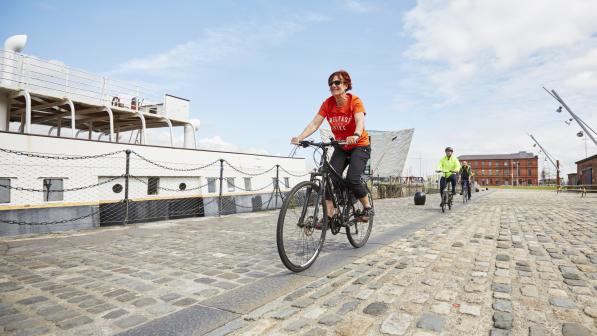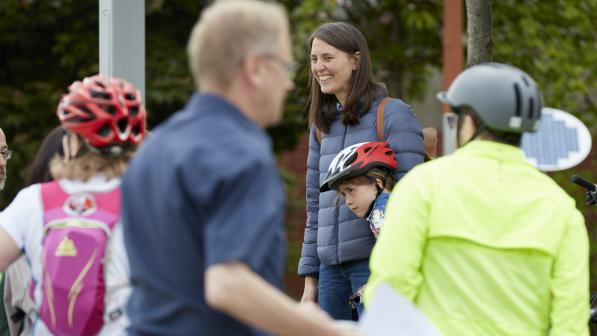Road Safety Strategy for NI puts cyclists and walkers “at risk”

- Cycling UK calls for DfI to review proposed Road Safety Strategy for NI to 2030 to ensure safety of all road users
- The proposed strategy fails to acknowledge the ‘hierarchy of users’ and the increased risk some road users pose to others
- Images available – https://www.skyfish.com/account#/folder/2051449
Cycling UK has criticised the Department for Infrastructure’s proposed Road Safety Strategy for Northern Ireland saying it is putting people who choose to cycle or walk’s “safety at risk”.
The proposed strategy aims to support policies across several Executive priorities including sustainability, economic development, climate change and active travel.
Yet despite the DfI’s promises to take forward “measures aimed at encouraging active and sustainable travel and identifying and addressing barriers to encourage and enable safe, active and sustainable travel choices”, the planned strategy is yet another in a long line of failures to encourage active travel as it fails to protect vulnerable road users and further entrenches car dependency.
Cycling UK, alongside other active travel organisations, gave comprehensive advice during consultation and recommended using the term ‘hierarchy of users’ to reflect the recent changes made to the Highway Code in Great Britain, which the DfI still hasn’t even consulted on, despite requests from Cycling UK.
This hierarchy acknowledges that while all road users should operate in a responsible manner, those in charge of the largest vehicles pose a greater risk of causing injury and death to others on the roads, and therefore, carry more responsibility for safety of more vulnerable road users.
However, despite DfI’s own research which identifies that “pedestrians, cyclists and motorcyclists are identified as the most vulnerable road user group” and “careless driving accounted for 72% of all collisions and 74% of all injuries in 2021”, the report continues to use the outdated term ‘shared responsibility’ throughout the strategy, which reinforces the notion that a child walking on a footpath shares the same responsibility as a lorry driver motoring at 60mph.
The DfI’s proposed strategy will put our most vulnerable road users’ safety at risk. Fewer than 3% of trips in Northern Ireland are taken by bike, and this strategy will stall this figure for even longer if they fail to acknowledge vulnerable road users in this strategy
Andrew McClean, Cycling UK spokesperson in Northern Ireland
Andrew McClean, Cycling UK spokesperson in Northern Ireland, said:
“The DfI’s proposed strategy will put our most vulnerable road users’ safety at risk. Fewer than 3% of trips in Northern Ireland are taken by bike, and this strategy will stall this figure for even longer if the department fails to acknowledge vulnerable road users in this strategy.
“The report states that one of the biggest barriers to active travel is the fact that pedestrians and cyclists simply don’t feel safe moving alongside traffic, yet the use of antiquated terms like ‘shared responsibility’ fails to take this into account.
“The introduction of hierarchy of road users in Britain’s Highway Code was a move away from the outdated notion of equal responsibility and a recognition that those presenting greater danger on our roads bore greater responsibility – but this progression has been ignored in Northern Ireland.”
The DfI’s proposals came just after announcements that Northern Ireland and the Republic of Ireland are discussing a joint bid to host the opening stages of the Tour de France in 2026 or 2027. Cycling UK argues a government failing to take the safety of utility and leisure cyclists seriously has no credibility if it then submits a bid to host the world’s biggest cycle race.
“It’s baffling Northern Ireland will put so much care, attention and likely funding into hosting the Tour de France for a couple of days while failing to make every day cycling safer,” added Mr McClean. “Cycling UK would love to see the Tour return to the island of Ireland, but a real lasting legacy for cycling would be for Northern Ireland to stop ignoring the essential work required to help people travel cheaply, sustainably and safely by bike.”
Northern Ireland has some of the lowest cycling levels in Western Europe. The Cycle Advocacy Network aims to facilitate and build groups across Northern Ireland who campaign locally to create the conditions that enable more people to cycle.
Notes to editors
- Cycling UK, the UK’s cycling charity, imagines a world where the streets are free of congestion and the air is clean to breathe, where parents encourage their children to cycle to school and everyone shares the exhilaration of being in the saddle. For more than 140 years, we’ve been making our streets safer, opening up new traffic-free routes and inspiring more people to cycle more often. www.cyclinguk.org
- After more than a decade of campaigning by Cycling UK, new Highway Code rules for England, Scotland and Wales were introduced on 29 January 2022. Cycling UK was closely involved in developing the changes, which should make our roads significantly safer for people cycling and walking, provided the changes are properly communicated, with clear, accurate and memorable messaging, and the new rules are backed up with visible road traffic enforcement by the police.
Press contact information
For more information, please contact the national Cycling UK press office. Due to the restrictions caused by the coronavirus outbreak, currently the main press office number (01483 238 315) is not being monitored. If you would like to speak to a member of the press office during working hours (0900-1700) please email [email protected]. Out of hours, call 07786 320 713.



